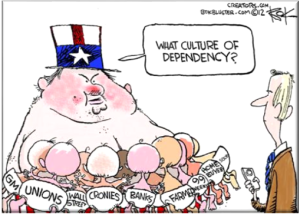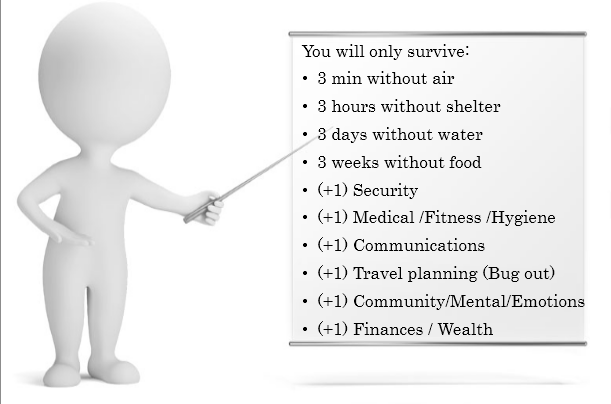What is preparedness?
Before we answer that question, let us observe what it is not. Throughout the years of my preparations, I have experienced a wide range of people and personalities. There are indeed some individuals who fit the stereotypical definition of an eccentric “Doomsday Prepper”. However, we must not stereotype or generalize our assumptions of people. Quite the contrary, the majority of individuals that I have met who are preparing for an uncertain future are well grounded with current events and are patriots who uphold the principles and values upon which this country was founded.
Preparedness is simply a way of life for some. Most notably you’ll find preparedness attitudes in the Boy/Girl Scouts, certain faiths (e.g. – Mormans), amateur radio operators, older generations, etc. In essence, preparedness is simply having the materials, knowledge and skills to provide for one self’s (and others’) basic needs (self sufficiency). It can be short term insurance, or long term lifestyle.
Why is it necessary?
Preparedness is an absolute necessity in today’s world due to one macro trend – The world has progressed into a culture of dependency to further progress.
In what ways have we become dependent?
- Public Utilities – Electricity, gas, water, waste
- Food – Grocery Stores
- Travel – Distance from work >Gasoline, cars, GPS etc.
- Communications – Internet, cell phones, etc.
- Medicine dependency vs.holistic health
- Economic woes –debt,bank bailouts, etc.
- Government “Assistance”(all the above)
So how do you start?
The first step in my opinion is to identify whether you want to prepare as a type of insurance (short term), or be prepared for anything and live a preparedness lifestyle (long term). The short term insurance option is what I always recommend to beginners. This is mostly performed by buying hard assets that you need to weather the storm (e.g. – water storage, food, self defense, etc.). These hard assets are then stored away in your car, home, etc. and are there when you need them. They require little knowledge, skill, or other time investment in order to utilize them.
The long term option requires considerably more time investment from the person. Not only does this include buying hard assets, but putting in the time to acquire knowledge and develop skills. Buying freeze dried food is a great beginner step for short term insurance, but gardening is the long term aspiration for continual food supply. Freeze dried food is a nice way of preserving food straight from the manufacturer, but you need to spend much more time dehydrating or canning your own food. Storing 5 gallon water jugs will get you past a couple days or weeks, but setting up a rain catchment system and cistern will support you longer. Get the picture?
Either option that you choose, focus on general preparedness (your core basic necessities). After you have acquired those, you can start investing in case specific preparations if you feel the need to (e.g. – biological epidemic).
Compartmentalize your preparations
This is the best way to not be overwhelmed by preparing. Below is some of the focus areas that I use for prepping. Depending on your individual needs, one category may be more important to you than another (e.g. – medical is very important for diabetics). Pick your categories one by one, use this website as a resource, and start preparing for a safer future.




